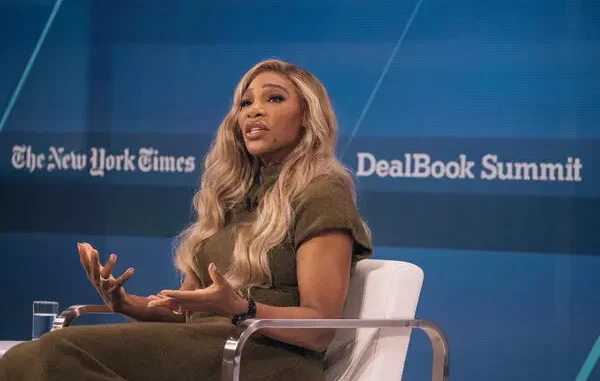
GOOD NEWS: Serena Williams Is Competing on a New Court: Investment

I’ve learned to trust my instincts in any business venture or brand I’m championing,” the retired tennis star said in an interview at the DealBook Summit
Serena Williams may have retired in 2022 from a record breaking career in professional tennis that catapulted her to global fame, but her post-tournament life keeps her just as professionally engaged, albeit in a different realm.
Ms. Williams, 43, is the founder of Serena Ventures, a venture capital fund that invests in early stage companies, primarily ones founded by women and minorities. Established in 2017, when Ms. Williams was at the peak of her career, the firm raised $111 million for its inaugural fund and has invested in more than 60 brands.
Serena Ventures comprises a team of seven, including Ms. Williams, and supports companies that positively impact “the everyday lives of everyday people,” she said.
They include Parfait, a Black-owned brand that relies on A.I. and facial recognition to create custom wigs and hair extensions, and Halp, a company that helps students navigate the process of studying abroad and make it more affordable. Serena Ventures also has a hand in the media and entertainment brand Boss Beauty, and Wile, a line of plant-based supplements for women over 40.
Beyond her venture fund, Ms. Williams’ professional pursuits encompass Wyn Beauty by Serena Williams, a line of makeup with products made with vegan ingredients and minimal chemicals. She also has stakes in sports teams, including, she said, the Miami Dolphins.
In her conversation on the main stage at the DealBook Summit 2024 with the event’s founder, Andrew Ross Sorkin, Ms. Williams touched on her competitive nature and her relationships with her family. She said that while her father, Richard Williams, might be perceived as tough, her mother, Oracene Price, was “way tougher.”
“So my dad was actually super kind and always saying, ‘Are you OK? Do you need to take time off? Let’s take a break,’” Ms. Williams told Mr. Sorkin.
She also shared that she lived with her sister and tennis competitor, Venus Williams, until she married the Reddit co-founder Alexis Ohanian in 2017, and that she and Mr. Ohanian keep their investments separate. But she noted, “he’s a wonderful investor.”
Ms. Williams spoke with The New York Times just before taking the stage at the Summit.
The interview, also conducted through email, has been edited and condensed.
Why are you interested in investing? And why focus on early stage companies?
A lot of people don’t know that I’ve been investing for 15 years. It was natural.
I started thinking about what’s going to shape our world, whether it’s through transportation, technology, consumer goods. Whatever that is, I wanted to be a part of shaping it. I want to invest in B-to-B [business-to-business] companies and know how I could invest in early stage companies early on and have a big reward. I didn’t know all the lingo at the time. I didn’t know that it was called early stage investing and that it was even a thing. I didn’t know that V.C. was a thing. But it is something I was drawn to because I am a curious person.
How did you learn the ropes?
I went to Silicon Valley and sat in different offices. I would call C.E.O.s and ask if I could hang out for a few days and ask questions. At Pinterest, in particular, I knew one of the guys on the board, and he understood that I had a lot of questions. It was cool to go to companies like that and learn.
Eventually, I started sitting on boards: Survey Monkey, Poshmark. Poshmark was a great opportunity to learn the ins and outs of taking a company public. I expanded my horizons with the insight of wanting to be a better investor, doing this long term and building a team. That was before I had a team.
Thankfully, because of my hard work in tennis, I was afforded different opportunities to go to companies and talk to the Sheryl Sandbergs of the world.
Early stage investing offers a greater reward, but also a higher risk. Were you ever afraid of the risks?
For me, that’s the hardest part. I love winning and being successful, but in early stage, 70 or 80 percent of the businesses fail that you invest in. I don’t like that. Having to accept that is difficult for me.
If one of our companies ends up not doing well, it’s heartbreaking. A lot of times they don’t do well simply because they can’t raise funding. Unfortunately, you see that happening a lot with companies led by women or people of color. They have a great product, but trouble getting past the early stage.
Leave a Reply